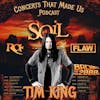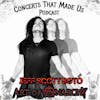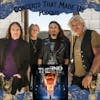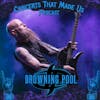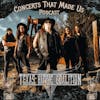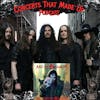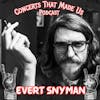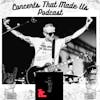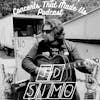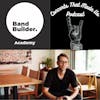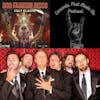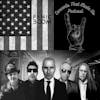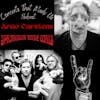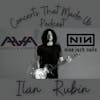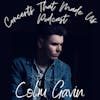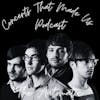Philistine: From a Childhood Promise to Lifelong Passion

In this captivating podcast episode, Brian engages in a lively conversation with metal veterans Marq Vas and Deangersmith, the talented members of the heavy metal band, Philistine. The spotlight is on their highly anticipated debut album, "Seranim," as they delve into the depths of their musical inspirations and creative process.
Marq and Dean passionately express their unwavering love for heavy metal music, revealing how it has shaped their lives and influenced their artistic endeavors. They proudly share how they managed to stay true to their roots while crafting the tracks for "Seranim," ensuring that their music resonates with both die-hard metal enthusiasts and newcomers to the genre.
As the discussion unfolds, the duo delves into the future plans of Philistine, eagerly sharing their aspirations and dreams for the band. They also touch upon the current state of the music industry, offering their insightful perspectives on the challenges and opportunities that emerging artists face in today's digital age.
Throughout the interview, Marq and Dean emphasize the significance of personal connection and authenticity in music. They recount their exhilarating experiences playing electrifying concerts and the unforgettable moments when they had the chance to meet their musical idols. These encounters have left an indelible mark on their musical journey, inspiring them to create music that resonates deeply with their audience.
In the final segment of the podcast, the conversation takes a thrilling turn as Marq and Dean recount their wild adventures in the music scene. They regale Brian with tales of late-night jam sessions, raucous after-parties, and the exhilarating highs and lows of life on the road.
To wrap up the episode on a thought-provoking note, Brian poses a hypothetical question to Marq and Dean: If they could spend 24 hours with any musician from history, who would they choose and why? The band members eagerly share their choices, revealing their deep admiration for legendary figures who have left an indelible mark on the music industry.
With their infectious energy and genuine passion for their craft, Marq and Dean leave listeners inspired and eager to explore the captivating world of Philistine and their debut album, "Seranim."
Find Philistine here:
https://www.philistineband.com/
https://www.youtube.com/@philistineband
https://www.facebook.com/philistineband/
https://www.instagram.com/philistineband/
Find CTMU here:
https://linktr.ee/Concertsthatmadeus
Newsletter: https://concertsthatmadeus.aweb.page/p/f065707b-2e34-4268-8e73-94f12bd2e938
If you would like to support the show you can do so by rating/reviewing us on Itunes and Spotify or by signing up at https://www.patreon.com/Concertsthatmadeus
Save 10% on Band Builder Academy membership by following this link https://bandbuilderacademy.com/Brian_Concerts/join and using promo code "concerts" at signup.
Become a member at https://plus.acast.com/s/concerts-that-made-us.
Hosted on Acast. See acast.com/privacy for more information.
Brian (00:00:00) - Dean and Marq, you're very welcome to concerts that made us.
Marq (00:00:04) - Great. Thank you very much for inviting us.
Brian (00:00:07) - I'm delighted to have you guys. I'm really looking forward to diving into your music for over the next bit. So you recently released your debut album, Seranim. What can you tell us about it?
Marq (00:00:19) - What can we tell you about it? Um, it's. It's. It was a project that came together. Um, after Dean and I. We had our first jam together. We were in high school, so probably 15, 14, 15 some way or should I say around about 16. And we always said that one day we would put a project together. And as the years progressed, we played in different bands sharing often the same bill. And Dean and I became best mates and had lots of wild parties after the gigs as one does. And we always said we would put something together and and eventually it came to fruition thanks to Dean. Dean You can guess fully in how the first track came around and then how the philistine philistine thing actually sort of was born.
Dean (00:01:12) - Um, I guess we should say thanks to Covid as well. Yeah. Yeah. Um, well, as Marq says, you know, it was a lifelong thing, us being in different bands all through the years and that kind of thing. Also in different countries at certain points. And we managed to get a few jams together in Canada when I was living with my brother and Mark was living on the east side of Canada and we were in the West, did a few demos and a couple of jams over there and then again ended up living in different countries and then Covid bless the planet. And obviously I had a lot of time to sit in my arms and do whatever you do during Covid. And I started writing some riffs and I thought, well, what a great opportunity, you know, to send. I sent the first one that I came up with, which was the song Blue Train. It's the second track on the album. I sent it to Marq and I said to him, like, How would you feel about doing some vocals on it? And.
Dean (00:02:10) - He popped some lyrics back to me on WhatsApp and we shot it back and forward like that, and I started writing the tracks like that. And before we knew it, we had half an album on the go and we decided to actually start getting together to, to, to do the vocals. And I used to travel up to Mark's place. I don't know if I can say the area where you live, Marq, If you, if you don't mind me saying that, I mean, I don't have to say it. Oh, fuck.
Marq (00:02:38) - It. Okay. No one knows me. Yeah.
Dean (00:02:39) - Anyway, yeah, but I travel from London to to Northampton and then we started doing vocals and we just took it from there. And within a short I mean, if you want to look at it as in in real time, I mean, the album was done very quickly. When I say we did it through Covid, that's like was a couple of years. But if you add up the real time that I actually spent writing the music and going up to Marq's place, I'd say we we cut the whole album in less than a month.
Marq (00:03:08) - Yeah, but there's a caveat to this is that the dean's missing an important piece is that when he sent me an idea for a song, I hadn't been in the business since Jesus was a baby, I quit it, actually. Singing. Grunting. Call it what you like many, many moons ago. And Dean carried on, and he has a fantastic solo project called Danger Smith and he sent me a track saying, I have got this idea. I want you to do the vocals on my album. I took a listen to it and I thought, Fuck, there's no way I'm going to do this thing any justice. These pipes are well worn. Well, Rusty, it ain't going to come together anyway. I'll listen to it for a while then. I thought some ideas in terms of lyrics and a vocal melody back and forth on WhatsApp. And then he said, All right, let's give it a go. And I thought, you know, what's the worst that can do? I can totally fuck the thing up.
Marq (00:03:55) - Then he'll do a better job anyway for his album and that's it. So he pulled a move on me did right He got. Yeah, we did the track. It actually went really, really well. And then that night I think after probably a good few Jack Daniel's to be fair and a few other Aperitifs mixed into that that evening, sitting on the couch, we said, Fuck it, let's do a project. And we dabbled with the name and came up with Philistine and that's pretty much how it was born. So Dean sugarcoated it slightly, but it pulled a move on me. Yet he did.
Dean (00:04:26) - Yeah. I knew he could do it though, because I'm when I mentioned Canada earlier, we we did a project song. They're not from Philistine obviously we didn't Philistine wasn't even thought of that then. But we did a song there, which is pretty cool. And Mark wasn't really happy with hundred percent happy with his vocals. And I always said to him, This was in 2013. I said to him, Yeah, one day I'll get you to sing and we'll make it sound good.
Dean (00:04:52) - And then this is what happened. So very happy with it.
Brian (00:04:56) - Nice, right? And you know, when it actually came to writing the music, then where did you guys look for inspiration?
Marq (00:05:06) - Oh.
Dean (00:05:07) - I mean, we've been listening to heavy music since I was in primary school, and as far back as I can remember actually being able to comprehend what music was. My mother used to play, you know, all the all the old stuff from those days Black Sabbath, Deep Purple, Jimi Hendrix and all the usual stuff and. And Judas Priest and, you know, Kiss. So, I mean, as far back as I can remember, heavy music has always been my first love when it comes to music. And I guess, you know, when I wrote these songs, it wasn't a thing of sitting down to look for inspiration. It was just taking inspiration from. I'd say from the 80s and 90 with heavy metal and heavy rock music, which to me is still the best ever, um, that's ever been written.
Dean (00:05:59) - And I guess it just comes from listening to all those bands and that kind of music, you know, it was, um, not.
Marq (00:06:06) - And I think then you hit the nail on the head, you know, when we started to put it together, we, we made a conscious decision that we weren't going to try and pigeonhole it and try and sound like the metal that's happening today or whatever the case may be. We just said, we're just going to go with it. We'll just write each track. You write the riffs, I'll come up with some vocal melodies. We will pin them back and forth and it will just evolve like it's going to evolve. And and we just termed it old school heavy metal. That's it. It's not trying to pigeonhole ourselves. And you can hear there's a variations in the songs, but the bottom line, it's just heavy. No frills, no fuck around. It's just heavy metal 101. And that's what we grew up on and that's what we play.
Dean (00:06:46) - Yeah, I mean, it's.
Dean (00:06:47) - It's stuff that we, um, we actually would like to listen to, which, um, you know, I guess it's like that for a lot of musicians, but, um, I like playing riffs that, that I think I like that I would love listening to not sit there and trying to write something thinking, Oh, I wonder what the public or I wonder what goes into thrash metal. I'm going to think of this or guys who are into doom metal or whatever, you know, there was none of that involved. It was just as Mark said, we'd write something and if we liked it, we ran with it. If we didn't, we'd kick it out the door and not never think about it again, you know? So the album is quite diverse when it comes to heavy music. I think there's a good there's a good few first songs on there. There's some real slow ones, and I'm surprised to see that in the in a recent article on, what was it, Terra Terra something online, somebody classed as doom metal heavy metals, heavy metal slash doom metal, which is a pretty interesting.
Marq (00:07:51) - Yeah 70 And another podcast said we play atmospheric music. For me what's atmospheric atmospheric is we I've been tripping off my face on bad that may be that was many years ago by the way so I'm not sure what that means. But anyway, if that's what they hear, that's what they hear. The main thing is the feedback has been absolutely fantastic. And I just want to add the final point. I guess we can move on as is when we wrote this. The outcome we wanted is we wanted to there's a dream that we had as kids, as we wanted to record an album for ourselves. Then one day we could show our grandkids. That's if I love that long, show our kids and grandkids. Then we actually did something together and we followed through on a dream. That sounds a bit cheesy, but Dean and I've been best mates Jesus forever. And when we can make that commitment and his mother's lounge playing music, we promised we would do something one day and we followed through on it.
Marq (00:08:43) - And I'm really, really pleased we have. And it was never about, well, it's of course it's important what people think, but what's more important was we wanted to make sure we actually delivered something for ourselves, to leave a legacy for ourselves, I guess that we could show our kids, you know, you can be the age we at and still deliver something.
Brian (00:09:02) - Yeah. And you know, now that it's out, are you guys kind of happy to sit back and let it simmer? Are are the cogs already turning in your heads and you're thinking of the next the next thing?
Dean (00:09:14) - It's funny you ask that, because just today I sent back a new song.
Marq (00:09:20) - Right?
Dean (00:09:20) - I wouldn't say a whole song. I sent him a couple of riffs and I said, you know, I'll tell you what happened is we are letting it simmer. We're doing a lot of promo and we are taking a bit of a break from actually, I will put it this way. I was doing all the promo and everything.
Dean (00:09:37) - I haven't really had time to sit and write anything and I did come up with maybe 5 or 6 ideas for new songs maybe a couple of months ago. And I actually messaged Mark last week and I said to him, I'm not really happy with him. It was just quick ideas, spur of the moment sitting there playing the guitar. So I recorded whatever came out. There's some good stuff there, but I don't think it's a quality. It's the right quality for a second album. But the riffs that I sent him today definitely on the way there, man.
Marq (00:10:06) - And definitely there will be a second album. We've already got a working title for it, which we'll keep to ourselves for now, but certainly just because it gelled so well and so quickly, we thought, Fuck it, let's do another one. What the hell? I mean, let's do another one. And if that works well, we'll do another one until we can't do them anymore. We're on a roll now. Let's just keep on going.
Marq (00:10:26) - So that's pretty much where we at.
Brian (00:10:28) - Nice. Nice. Doesn't sound too bad at all. And you know, as you mentioned, you guys have a rich history in the metal scene. Not to make you feel old now, but dating back to the mid to late 80s having having both played in some prolific bands, What are your thoughts on the industry today compared to when you guys were starting out?
Marq (00:10:50) - Um. You know, I still listen to a lot of stuff all the time. New stuff, old stuff. And I just think the scene has changed so much. It's. It's. It's. There is so much to listen to that it all becomes very blurry and messy and and it's hard to really dig through the masses of stuff to find something that's really, really stands out. And it doesn't necessarily need to be a new a new sound, but just something that stands out. And I guess because technology's made it so easy for everybody. So one, technology's been a game changer, a positive in one aspect, but also negative because it's almost too much out there in a way.
Marq (00:11:35) - Um, and yeah, and then the third point is coming back to my point about atmospheric and mean. Now we've got a category for everything fucking folk metal, underwater pop up toaster technology, metal. I don't know, death metal. I'm alive. Metal. I mean, tick, tick. I mean, we just play heavy metal and maybe it's because we're just older than most folk who are still playing. I don't know. But there's the things that have changed for me. Just there's too much out there and hard to do. Work through everything and find something that really stands out in this day and age, I guess. And also all these weird and wonderful categories don't get it, don't understand it. And maybe it's just because I'm just not worth it to the kids. I don't know. That's my view.
Dean (00:12:18) - Yeah, I totally agree. I think technology has had a lot to do with it. But going back to what I said earlier, growing up in on the 80s and really the 70s, 80s and halfway through the 90s growing up and those bands, all the bands that we grew up on were unique.
Dean (00:12:34) - I mean, you could put you could hear three seconds of class miner from the Scorpions start singing and you'd know it was three seconds of Brian Johnson and, you know, Bon Scott and you'd notice them sometimes even just a guitar riff, you'd know it was Angus, you know, like, I'm here. All those singers from those days, they all had their own unique sound. I mean, Ozzy, no one sounds like Ozzy, man. And the problem for me is, and this was already, I'd say ten years ago, I used to own a. The show for radio station, Internet radio station that streamed out of Darwin, Australia. And the one evening I thought I'd have some fun and I took some I think it was like 10 or 12 different songs from all the latest bands for that year. And they were all obviously some of them were metalcore. But I played, I said to the listeners, I said, I'm going to play this new album that I've heard and you can tell me, Oh, you can come in the chat room and we can discuss it off then.
Dean (00:13:31) - And everyone came on and were like, Wow, what a killer album. It was fantastic. What a good who's the band? And I said there was 12 different bands and honestly, they couldn't tell the difference between the singers and even the style of music. They all thought it was the same band. And that was I did that to prove a point, you know, of where I think heavy metal has come compared to where it used to be. I'm not saying it's shit or anything. I mean, like Mark, I do listen to a lot of new stuff. I mean, I subscribe to YouTube music, I'm always listening to new stuff, but it's far and there's few and far between where you actually find a band that sounds really unique. So I think that's where the state of heavy metal is at the moment for me anyway.
Brian (00:14:14) - Yeah, yeah, that's a good one though, actually, if that's the case as a new band putting out a new record, how do you make sure that you stand out from the noise and make us unique?
Dean (00:14:29) - Well, you know, I think you don't sit and purposely try and be the fastest fucking band since.
Dean (00:14:36) - Slayer came out. I know there's way faster bands in that now, but that's not what we can't do. And this is I'd give advice to anybody who cares about how fast you can play. And it's been done a thousand times. When Chemical Warfare came out from Slayer, it was the fastest song in the world. After that, everybody just had to try and prove that they could be faster. And obviously some were faster, some just made a fucking mess of it. Denton be the biggest grunty vocalist that you can find. That sounds like a fucking ogre because there's 5 million other bands. That sounds exactly like that. And you can't tell the difference between the singers And to me, you know what? I'd rather not listen to that. There's a few bands that do grunt and sound like ogres, but they sound really cool. But how many are they? I mean, there's like, millions. And at the same as. Yeah. Carry on. Look.
Marq (00:15:29) - No, no. Go on, go on.
Dean (00:15:31) - That's what I think. I was going to run out of words.
Marq (00:15:35) - And you know, just to tag onto that to me, What advice would I give any band starting out? Just play what feels right for you. Don't you mean everybody's obviously copying something because we've all learned something and inhaled it by osmosis, listening to music. So there's things going around in your head and you're not going to come through in your fingers or come through in the voice. They're all going to be similarities, but just just play what works. And and it's not trying to well, you know, we're going to try and sound like them and sound like them. If you that purposely want to sound like that, then go and join a cover band. You know, use Rival Suns, for example. I mean, that's a really heavy rock. I mean, when they came out, they just, you know, they were throwback to the 70s, but they weren't trying to sound exactly like a 70s. Band went, Wow, that is so cool.
Marq (00:16:18) - They just playing what they feel and it's their whole 70s dirty rock sound, but it works and and that's an example. Just play with what feels right.
Dean (00:16:30) - I think it's it's virtually impossible now because of the music market is so saturated because of the internet. Anybody and everyone can put out music now it's virtually impossible to sound original now. I mean, back in the days when we heard those bands, the ones that are mentioned, they all have such a unique sound. There was there was a lot of bands, but there wasn't as many as it is now. And also then there was a different process, you know. And so I think I don't know, it's really difficult to be original. I'm not saying I record sounds completely original, but it does have its own sound. People might go, Yeah, where I can hear a bit of an influence of this and that and that's that's going to happen with anybody. Everyone has the influences. But I think we have something quite unique sounding for, for, for compared to what is all coming out these days with all this speed and trying to be the heaviest singer and whatever, you know, and trying to be the most technical.
Dean (00:17:26) - I mean, we just do what do what feels right to you. If something sounds good to you, then then play it and release it. Don't worry about what anyone else thinks, even if it sounds like Pantera or Metallica or Fucking in Flames or whatever your whatever it takes, whatever influence it sounds like that, then then use it. But if it's if you don't if you think it sounds too much like one of your influences and and you might get called up on it and then throw it away man.
Brian (00:17:55) - Very good advice. And, you know, I suppose at this stage we will dive into your history when it comes to music to give the listeners a sense of where you guys come from. So it's a bit tricky now, but if you can, can you remember your earliest musical memory, You know, the first time you really took notice of music?
Dean (00:18:15) - I think for myself, which is probably be around about 5 or 6 years old and it was. A kiss kiss record. I mean, just the look of it, first of all, was I found this record with these guys, with this makeup.
Dean (00:18:31) - This was my mom's. And I think it's something like that Kiss or Hendrix or something, but that it was definitely rock and roll. And just put me, man, I was it was I knew it was the style of music. I mean, after that, I started collecting records when I was still in primary school.
Marq (00:18:52) - I think for me, um, my grandmother, uh, Grandmother Mercia, um, I would say gave me the gift of music because as far back as I can remember, think before when I was still walking on my knees, so to speak, and shifting in a nappy. There was an Elvis record. I mean, all the time. So the first music I ever heard in my mind and then I'm talking right as a baby was Elvis. And then she was into full on rock and roll. Everything was rock n roll. She would play. She had rock and roll records. And so I got into that. And then from that, you know, it sort of grew into to listening into the heavy stuff.
Marq (00:19:30) - But I come from Afrikaans families, so it's a bit of a dichotomy here because my one granules into two to full on Elvis Presley, where my other side of the family are Afrikaans and they played Buddah music or Afrikaans folk music, which I grew up on, which to this day I still collect and listen to which people think I'm absolutely mad. So listen to loads of stuff. But certainly my first memory was Elvis Presley for sure. Jailhouse Rock. I can remember it was yesterday.
Dean (00:19:59) - Yeah. I also remember my mom playing some African music, some Zulu music.
Brian (00:20:06) - I like it. I like it. And, you know, if you had to pinpoint a moment, then that sparked the desire to become a musician, what would you say it was?
Dean (00:20:15) - For me, it was Angus. Young man. I can remember. I remember my mum took me to the shops one day to CNA, which was a shop in South Africa that sold stationery and all sorts of shit, and they also had a record section.
Dean (00:20:29) - And she said to me, Go and choose your first record. I think I was maybe 8 or 9. And I went and then I started scrolling through the records and I saw the Rolling Stones one with the lips and the tongue and all that and saw some South African stuff. And then I saw the cannon. And it was like, What the fuck is this? Canon For those about to rock. And it was like, God damn it. And then I was in boarding school, and then one of the guys in boarding school gave me a video to the VHS videotape to take home for the weekend and put it on. And it was an AC DC concert and that was it, man. You were just Angus, man. I wanted to be Angus right up until I was in my 30s.
Marq (00:21:11) - You still.
Marq (00:21:12) - Want to be Angus The problem is your school blazer doesn't fit anymore.
Marq (00:21:15) - And that's it, man.
Marq (00:21:17) - So if think back now, similar to Dean at a good mate of mine and his sister was somewhat older and her boyfriend was somewhat older and we were hanging out, I was hanging out at his house and he brought a bunch of vinyls around and I'll never forget it was Led Zeppelin for the first Boston album and the first Van Halen album.
Marq (00:21:39) - When I saw the picture of David Lee Roth on there, I said, I want to be David Lee Roth. And that was it. It was the I don't even listen to the record, but just looking at the picture of David Lee Roth, I'd say that's who I want to be. And that was that was it. It was like the switch had gone off. I want to be Dave.
Dean (00:21:57) - And that's funny that you say that, Mark, because it's only the other day that I just told Mark that when he was in Metamorphosis and I was in in Odyssey and Two Dogs and in South Africa and I used to watch Metamorphosis play. I've never told anyone this, but always used to in my mind. I used to say that Mark was was the David Lee Roth of Death metal, because honestly, you had to be there to see this guy on stage, man. It was like full on metamorphosis. It was like a really heavy death metal band. But Mark was like David Lee Roth fronting them.
Dean (00:22:33) - Couldn't stand, couldn't stand still, fucking somersaults, cartwheels swinging from the lights, all that shit. So I used to, just in my mind, always used to think he was the David Lee Roth of Death metal.
Marq (00:22:45) - Wouldn't do that today.
Marq (00:22:46) - Jesus.
Brian (00:22:50) - You're sure you won't give it a try, you know.
Marq (00:22:52) - Well, you never know if someone brings out a big checkbook there with some big numbers. Not things to know, huh?
Dean (00:22:58) - But a bit of Jack and some Guinness mixed into one, you know?
Marq (00:23:02) - Yeah, that's true.
Brian (00:23:04) - That'll get you going. All right. And you know, it's called concerts that matter. So we have to talk about concerts. Now, as a concert goer, what concerts would you say have made you?
Dean (00:23:17) - Um, there's been, I think, the best one I ever saw. I saw Black Sabbath in at Sun City in 1997, but it wasn't the original lineup. It was with Tony Martin on vocals. It was really cool. It was flipping excellent.
Dean (00:23:31) - And because I'd never been to a proper metal concert, I mean, or not, I'm not saying a proper one, an international one ever in my life that was like blew me away. And it was I thought it was the best thing I'd ever seen. But in 1988, I went over to Belgium and I saw the Metallica and Justice for All tour and Queensryche were it was a double headliner because they were both on the same label at that stage and it was the Operation Minecraft Tour. But that and justice for all to change my life, man. I never seen anything that heavy and that well-rehearsed and just so over the top metal ever in my life was fucking excellent.
Marq (00:24:11) - Yeah. And, you know, Dean, you make a point. Is that what the listeners may not know is that, you know, coming from South Africa through that whole apartheid era, bands were were not where bands boycotted coming to South Africa. So we were starved for see anybody live. It was just the odd band here and there.
Marq (00:24:31) - I mean, I also was at that sabbath gig and it was fantastic. But I remember going to L.A. Would have been early 90s and saw Helmut Sepultura in ministry on the same gig. And when I said absolutely beat my mind, I mean it was unbelievable. And in the same week I saw Pantera and I always wanted to play more the heavier rock stuff. And Dean will remember basically when I got back from LA that year, I went and handpicked people. I said, Right, we're going to start something that this country has never seen in South Africa and we're going to rip it a new asshole. We're not for metamorphosis and we just just let rip. We blended all of those styles of music into what Metamorphosis became. But that helmet, simple tour and ministry on the same bill was just it was I'd never seen those live. I'd never even seen videos or the bands. It just absolutely blew my mind. And of course, seeing Pantera was, Wow.
Marq (00:25:25) - Oh my God.
Marq (00:25:26) - Yeah, it was like, okay.
Marq (00:25:28) - I mean, there aren't words to explain it. Pantera is Pantera. I mean, it was it was just unbelievable.
Dean (00:25:35) - Yeah, I'd say it was definitely the injustice one for me. And then also saw in 99, I saw the Black Sabbath reunion tour in Birmingham in their home city, and that was another one that I think it was system of a down that opened up for them. They were only at the first record out at that point. And but the Sabbath was just incredible as well. Seeing Tony Iommi and Ozzy and Geezer and Bill Ward, it was amazing.
Brian (00:26:01) - All the crap. You make me seriously jealous. You made me think of something there. Actually, when you were chatting about your own bands, how were you guys received back in those days in South Africa? I'd imagine metal wasn't kind of very welcomed.
Dean (00:26:18) - It wasn't in the mainstream like on on commercial radio and TV and stuff like that. It wasn't we as such a struggle to get airplay. There were the odd gigs. There were people who had little clubs here and there.
Dean (00:26:31) - We obviously formed like our own underground following and we and we got some something going like that. But for anything commercial on TV and radio, it was virtually impossible. I mean, I don't know if you remember, Mark, we had this show called Pop Shop and I used to play music videos and if there ever was anything metal, I remember seeing Kiss. I love it loud on it, but they would always put the metal song. Yeah, yeah. They would always put the metal song right at the end. And while the credits were coming up over the song.
Marq (00:26:59) - Yeah, you said piss me off. Yeah. No, you're right. I mean, metal was seen as massively controversial in South Africa. And, um. And Dean may recall during the Metamorphosis days, we did cause a bit of controversy. We threw the goats carcass off the stage onto the people that didn't go down. Animal Protection Association. They sued us. What else was there? Yeah, we got banned by a church from playing in a certain small town, but we managed to play anyway.
Marq (00:27:31) - And I went on stage wearing a priest's outfit and reading from a porn magazine and which I think which I. They tore off the priest's outfit into the first song and had a soccer jersey made with the numbers 666 at the back. So the police stormed the play. Oh, my God. It was absolute chaos. So, yeah, a lot of controversy, a lot of fun, but certainly not welcomed by the mainstream, to say the least. No.
Dean (00:27:59) - Not at all.
Brian (00:28:01) - I can't imagine why. And, you know, are you guys going to be touring the album or playing gigs in support of the album?
Dean (00:28:11) - No, not at this point. Like we got asked this in an interview the other day. Not a not not a verbal one, just a written one. And my answer to this was, if Metallica or Black Sabbath came knocking and asking us to open up for them, I'm sure we would gladly quickly find a basis in the drummer and do some live gigs. But up until that point, we're not really looking to do it because, I mean, I've done my time with going down and playing at the pub to ten drunk people.
Dean (00:28:44) - I'm just that's there's no point in that for me. And there's no there's nothing. I don't get anything out of that. You know, I would I would do a big gig if the right thing came along. But otherwise, no, we're not touring anything now.
Marq (00:28:57) - Yeah. Spot on, Dean. You know, we've paid our dues, carry the carry, the sort of the amps and stuff and then obviously play the bigger stages and so on and so forth. But it was never on the cards from when we put this project together for us to ever play. And to be fair, we actually didn't think it would be getting the traction it would be getting anyway, as I said, because the ultimate goal for us, we wanted to do something for ourselves that we could, you know, show the kids one day that, hey, you know, the this old man still actually did something at their age and that's it. And lo and behold, it's just it started the promo pieces. We've done some work in the background, but it's not like we spending every day, you know, pushing the promo pieces.
Marq (00:29:36) - It's sort of finding its own way around and people coming to us or we're in wonderful people coming out of the woodwork. So we're massively surprised by the positive response so far. But actually getting out there and and doing the thing. No, no, I can't see that happening.
Marq (00:29:52) - Right, right, right.
Brian (00:29:54) - And, you know, the gigs that you've played in the past and over your entire.
Marq (00:29:57) - Career.
Brian (00:29:58) - When you think of them, is the one that sticks in your mind as maybe the most perfect experience you've had.
Dean (00:30:05) - Uh, not so much about perfect, but, um. I mean, we toured. We played with. I played in quite a few bands back in South Africa, and we we did the whole touring thing. We toured the one of the bands. We even pulled out of South Africa. We went to Botswana and places like that. But I'd say the most memorable one for me was when we the first National Freedom Day that South Africa had in anything, which is an area in South Africa.
Dean (00:30:37) - After Nelson Mandela was released at the first annual National Freedom Day. And I played there in a band called Brethren, and it was the weirdest experience ever because the whole stadium was all African people and there was a few bands. It was mostly African music. And then one of my friends school band was on there like a brass band, and they managed to get us on it. Now we lost three piece White Rock Band and the African people are now things have changed. But back then, rock music was not something that they would listen to. And we started playing and it was pretty cool. But there was there was guys standing in the front with the fingers in the ears looking at us, and there was guys on the side getting, Get off the stage, get off the stage. But we, we did our set and we walked off after that. I'd say that was the most memorable and fun one for me. I don't think I've had a perfect gig.
Marq (00:31:37) - I think for me, every single time I got on stage was memorable.
Marq (00:31:42) - It was just a thing for me. It just became somebody else and just unleash the beast on stage and just went absolutely mental. But I mean, there's two quirky gigs that stand out for me. There's a there used to be a massive festival in South Africa called called Opie Copy, which I mean easily 10,000 people would attend and it would generally be more sort of rock folk, you know, crossover, all sorts of stuff. So we were the first metal band to crack it by accident because the band pulled out at the last moment and we got the 2 p.m. slot on the B stage on the Saturday afternoon, and the band that was supposed to be playing was going to be, I think, some folky band and so on. So there was no announcement that the change was going to take place. So I remember us being backstage and me looking sort of through the curtain, so to speak, and we had families with a blanket sitting there and everyone's chilled and one woman had a basket and the kid was running around the baby.
Marq (00:32:44) - And so the other band said, Shit, or you could do what you usually do. I said, Well, of course we are. That's why we're here. Anyway, when we got there, I used to have this thing where I used to. It was a bit of a bit cheesy now, but I used to rip my T-shirt off and inspect and do all this crazy shit, like as I ran out. Then we started that opening song. I did that. When I say literally everybody that was sitting there with kids, it was what you'd swear there was a fire coming or a bomb was gone off. The people were singing into the trees and like you could and it just emptied out and it was absolutely hilarious. Anyway, we were invited back the following year to to be on the main stage. And then similar to Dean, we played, we were invited to a gig which had a whole array of different bands. Weird styles mean jazz, and there was some electronic stuff and we were the only metal band and we of course, they put us on last at the evening and it wasn't going down well.
Marq (00:33:43) - And there was a girl and her boyfriend right in front of me and the entire fucking city. They were heckling and showing me the finger so and I could see the band were getting nervous. They knew I was going to do something. So I thought, Fuck this. So I pull down my pants and I pissed on it. And needless to say, they exited the building stage left. We finished the gig and needless to say, they didn't pay us. We were never invited back and we didn't give a fuck anyway. So there's a there's a memorable one.
Marq (00:34:16) - Oh my God.
Dean (00:34:20) - I remember another one when we were playing in Odyssey and it was one of these outback Afrikaans village places where like a real one was Stan and Neil Ford was actually played bass for Mark's band Metamorphosis. In the end, we were under the stage getting ready to go on and we all started smoking weed. And there was there was a gaps in the wood of the stage. So it all started filtering through the stage and into the audience and police were called and all this, and Neil Ford was pissing in a piano and jumping on the piano and all sorts.
Dean (00:34:58) - And then when we started playing, um, Bernard Singer or Bryn Edison, halfway through the set, someone came in, put a note by his foot and said, Please.
Marq (00:35:08) - Up.
Dean (00:35:11) - So we carried on playing. But obviously this being a metal gig, the guys started moshing and stuff, so they thought the people that owned the place thought that they were fighting. So the bouncers came and beat up all the metalheads. So there you fight in our club and they started beating them all up and throwing them all out. And eventually there was no one left in the club. And we had the note there saying, Please stop. So we stopped and we left.
Marq (00:35:36) - Welcome to South Africa.
Marq (00:35:38) - Oh.
Brian (00:35:40) - I have to say, those are some of the best and funniest stories I've heard now.
Marq (00:35:47) - Oh, man.
Brian (00:35:48) - I usually follow up that question with, uh, what's the worst gig experience and how you overcame it? But I'm not sure I need to know.
Marq (00:35:57) - Why not mix and match in there and for sure.
Brian (00:36:00) - Yeah, yeah, exactly. Exactly. And you know, back in those days, then if that's the kind of stuff you'd get up to on stage, what sort of antics did you get up to backstage while you were on tour? There must be some pretty wild ones.
Dean (00:36:13) - Oh my God. I've The police aren't listening.
Marq (00:36:19) - But honestly, there is. There is. There is some stories that I can honestly, especially with Dean and I, what we got up to that it's just really it's not for public consumption. I mean, really, really out of control stuff. I mean, Jesus is alive today is an absolute miracle.
Marq (00:36:36) - Absolutely.
Dean (00:36:37) - I'll just say this and I'm telling you, I'm not saying this because I'm trying to pick us up or anything, but Motley Crue and Ratt and all those all those boys in L.A. They had fuck all on what we got up to. Seriously, if they came to Johannesburg, they would have gone home running with a tail between their legs.
Marq (00:36:55) - Yeah, they was.
Dean (00:36:56) - They was, it was just out of, I mean the stories man. Hells angels and people getting shot and fucking getting hammered in the head with hammers. And I mean, that was just that was like the downside of some of them.
Marq (00:37:07) - But yeah.
Dean (00:37:08) - It's completely wild parties, man. Completely out of all the stuff, I just. I don't know. It's too much to actually start mentioning.
Brian (00:37:17) - Yeah, right. So how are you guys still alive? Jesus.
Marq (00:37:21) - Yeah, Thank God.
Marq (00:37:22) - We honestly, I made a conscious effort. A conscious decision, you know, once we released the blasted album and it's it got some decent attention overseas and we were on, according to the promoter here in the UK at the time, Roadrunner, we were keen to sign us but at the at the last moment decided not to do to leave this legacy of apartheid and all that shit. And at that stage the, the band were so out of control with all sorts of stuff that I didn't make a conscious decision that if I didn't put the brakes on, I wasn't going to make another year.
Marq (00:38:01) - And and I actually decided to just park it. It was just, just turn the switch off. Uh, and yeah, because I wouldn't be even on this call today if I hadn't done that, that's for sure.
Dean (00:38:11) - Yeah. I think a lot of us nearly were on the verge of burning out.
Marq (00:38:15) - So we.
Dean (00:38:16) - We kind of made that call. And I mean, even the other guys that were in the bands with us, they everyone sort of dispersed in. Some went overseas, some stayed there. And there was a few years of of silence.
Marq (00:38:31) - Yeah. And I.
Marq (00:38:32) - Think the rest all of Johannesburg going thank God they've all disappeared for a.
Marq (00:38:35) - While.
Brian (00:38:40) - Oh what's it like then when you get back together with all the guys you were in bands with is a kind of back to your old ways, or is this just kind of more sensible and you sit around and reminisce.
Dean (00:38:52) - I mean, there's I don't I wouldn't say there's there's the drugs that were going around back in those days. It's definitely alcohol and people.
Dean (00:39:00) - I mean, I hardly even drink anymore. But, you know, when you have some drinks and you get a bit pissed with your mates and stuff and have a laugh, you know, but I don't think, um, well, if we had to get up to what we did back then in London, I think we'd be arrested in within minutes. So I think getting older also, you know, it kind of makes you and, you know, having, having kids and all that kind of thing, You know.
Marq (00:39:24) - I just want to just remind you that the drinking. Just a quick reminder. Remember when we went we had the VIP, the tickets to go and see Slipknot and who else? And Korn and and we managed to get through. Korn managed to get through Slipknot or and or was it or no corn were opening and about four songs into Korn we got thrown out. Do you remember.
Marq (00:39:48) - That?
Marq (00:39:50) - Because we drank enough Jack Daniels from our house to Nottingham that most people probably wouldn't drink an entire weekend.
Marq (00:39:57) - So the.
Dean (00:39:58) - Limousine.
Marq (00:40:00) - Had a limo ride and yeah, so and we got thrown out. So let's, let's we this. So there are occasions that we do rip the ring out for sure.
Dean (00:40:08) - It was hilarious. We were basically frog marching us out of the venue and Mark was busy tweeting while on Twitter. He's going on Twitter. He's going, we're getting kicked out of Slipknot. And I was I was I was begging. The guys are saying, can we please at least have our ticket stubs so we can remember the gig? And they were like, fuck off, get out.
Marq (00:40:27) - That was just before Covid. It wasn't like it was 10 or 20 years ago, right?
Brian (00:40:33) - I didn't even think it was possible to get kicked over Slipknot gig.
Marq (00:40:37) - Wow.
Dean (00:40:37) - A lot of people said that to us.
Marq (00:40:39) - Yeah.
Brian (00:40:43) - Oh, well, it's good to hear you haven't slowed down any, so. And you know, at this stage with the new album, how do you guys handle criticism or negative feedback about your music? Does this bother you at all?
Dean (00:41:00) - You know what? I'd be a liar if I say it didn't.
Dean (00:41:03) - But it's not a back in the days, if somebody told me that, I would just call him anything and everything under the sun and tell them where to go these days, you know, thankfully I haven't had anything with this album yet, but if there is negative feedback, it's quite. If it's constructive, you know what? I'll take it in and I'll give it its dues and and I'll learn from it if it's just a lot of bullshit. Whatever, man. I just let it go over my head and I don't even pay any attention to it. I mean, that's I think if you, if you let negative comments and stuff get to you in the wrong way, it's going to affect the way that you live. Even then, they don't make music. That's all welcome. You know what I mean? It's nice to hear what different people have to say about this stuff.
Marq (00:41:52) - And then you're right. I mean, it's 100% not everyone's cup of tea, heavy metal, period. It's not everyone's cup of tea.
Marq (00:41:59) - And if there is negative feedback, you know what? Again, we've not done this to try and earn a living. This is not what we're taking on the road. This is not going to put bread on the table or, you know, be the difference of us living on the street or living in a fucking mansion. It's irrelevant to us. We did this for one specific reason to fulfill a promise we made to each other as kids that we would take something out and we'd release it. And you know what? If we didn't sell one copy, we actually don't give a shit. If we sold a million copies, whoopee do It was it was just what we wanted to release. So, you know, people, they people have their own views and they welcome to that. And, you know, I'm just going to take it on the chin and move on if it's negative. And as Dean said, fortunately, we've had none. Well, not that we know of probably is, but certainly not seen it out in the media or being told by classmates of ours that we have good relationships with, that we know that can be open with us.
Marq (00:42:55) - They've all been massively complimentary, much to our surprise, actually.
Marq (00:42:59) - Yeah, I mean.
Dean (00:43:00) - Through the years, you know, once once we all left South Africa and there were some comments like because I've never stopped playing music, I've been I've been recording and writing my whole life. And there was a point where a few people back in South Africa who were in bands back then were not in bands anymore and haven't even touched an instrument since those days said stuff to me like, Oh, when you're going to grow up and and like I said, Well, what are you talking about? You know, they said, Well, when are you going to stop doing music and shit? You know, you're never going to make it. And I was like, fucking shut up, man. Yeah. You know, because even if making it is not even that means nothing. Like Mark said, if something happens, then whoopee doo. But like, it's not about that. Music is in me and it's in us.
Dean (00:43:44) - That's where you get people going. We like it or we don't like it. It doesn't really matter to me anymore. I mean, it's cool when people like it. Don't get me wrong, I'd be lying if I if I. I wasn't happy. When I see people complimenting the music and and the way we play and that kind of it feels good. But it's not going to make or break the way I feel about making music if that's if that explains it a bit better on those.
Brian (00:44:10) - And it's nice segue to the next one. If there was no music, if there was no music careers, you'd never got into it. What would your lives look like, do you think?
Dean (00:44:20) - Oh, fuck. I don't know. I think I would have fucking died long ago from boredom.
Marq (00:44:25) - I mean.
Dean (00:44:27) - For me, music is. Is life, man. It's, um. It definitely is. I don't want to sound cliche, but it's definitely is the only true international language. You can take a drum or you don't even need a drum.
Dean (00:44:40) - You can just beat on your chest in any country, in anywhere in the world, even in a remote village, if you start beating a beat, people are going to move to it. And like I said, that's probably where the first music came from, like cavemen beating on rocks or whatever. So if the music didn't exist, I'd like to. I'd like to ask you a question. What do you think would be in its place?
Brian (00:45:05) - Music didn't exist. Oh, man.
Dean (00:45:09) - I think I'd be fucking tired of boredom, man.
Brian (00:45:12) - Oh, yeah, completely. You'd. You know, music gets you through so much. You know.
Marq (00:45:18) - When.
Brian (00:45:19) - There's joyous moments in your life, you associate that with music. When you're going through hard times, the music helps you get through.
Marq (00:45:26) - Yeah.
Brian (00:45:27) - I actually can't imagine what would be there instead of music. It's an impossible question to answer, I think.
Marq (00:45:33) - Yeah.
Marq (00:45:34) - I mean, I was just. I was just thinking the same thing. I mean.
Marq (00:45:37) - I mean, I was heard music Elvis Presley when I was in nappies, diapers or whatever the language they use in different countries. I mean that's and so to imagine not having music around me is almost it's impossible to try and fathom that. It's just it's it just I don't know. You're right. I mean, it just doesn't it doesn't resonate. The wires don't connect.
Dean (00:46:02) - I'm trying to imagine it while you guys are talking, and it's making me nervous.
Brian (00:46:10) - Oh, and, you know, looking to the future, then how would you guys like to evolve as a band? What would Philistine look like in, say, five years time?
Marq (00:46:21) - Um.
Dean (00:46:23) - I would like to have at least another 2 or 3 albums out.
Marq (00:46:27) - Jesus, Thanks.
Dean (00:46:31) - And, and to be quite honest with you, I would like to actually do some live playing. But like I said, it's not going to be down the road at the local. That's just not ever going to happen again. Um, I don't know.
Dean (00:46:46) - I'd like to have a bit of success with this. You know, if this success doesn't come, it doesn't matter. Um, like Mark said, it's not like we're doing this to make a living or to live in hotels or live in mansions or all that kind of thing. I mean, at this point of our life, we know that. And it hasn't it kind of happened for us back in the day because we played music and that's what we did. We didn't have jobs. We toured the country. We hung out. And there was a place called Rocky Street, which was like the ally of Johannesburg. And it was we were living that kind of lifestyle. But that's over and done with, man. I mean, you can't. Most people who try and do that their whole life end up either in a coffin or they can't talk anymore and they like a fucking vegetable. So, I mean, thankfully we and I don't want to use the word grow up because of what those guys said to me.
Dean (00:47:36) - But thankfully, we did grow up a little bit and make something of our lives, which has given us the opportunity to still play music and do this kind of thing, you know? So. I'd just like to see see more albums out and hopefully we can still keep making good music.
Brian (00:47:54) - You couldn't ask for any better than that. And before we dive into the last couple of questions, then, any future plans set in stone you want to let us know about after the album or anything to do with the album?
Marq (00:48:07) - It.
Dean (00:48:11) - We've just released. Yesterday, we released a the third single, the fourth, the fourth single, the actual song Philistine. We released that well, new video for it to release yesterday that's been put out on a YouTube channel. I think we're going to do one more. Who knows? I don't want to say one more and make that definite because with the technology we have nowadays, it's very easy to do a video for each every song on the album, you know? But we're going to do one more.
Dean (00:48:43) - I won't say what it is now, but it won't be in the next couple of weeks. It'll be in a while still.
Marq (00:48:49) - Yeah. And also it's hard to tag on to that is that we are going to be releasing a vinyl and that's going to come down the pop in a while. Still once sort of the downloads and streams have run their course and it's going to be a limited edition vinyl. And that's there's one key reason because Dean and I are massive vinyl collectors. So we want to.
Marq (00:49:09) - Do vinyl.
Marq (00:49:10) - To head to our own vinyl collection. But and I know you were conscious of time, but I'm not sure if you're aware that before our album was released, it was banned before it was released.
Marq (00:49:22) - Oh God.
Marq (00:49:23) - Yeah. We went to a certain distributor and we promised Earth and sea, and then literally 2 or 3 days before the album was supposed to hit all the streams and downloads, etcetera, we got a notification that the album was banned. And I'll tell you, the they're not pissed off puts it mildly, in which you need to figure.
Marq (00:49:46) - And to this day we're still not quite clear. But the message we got was that the the lyrics goes against the standards of all these platforms and it just was absolute fucking bizarre. But anyway, we managed to and actually another international distributor came to our rescue and maybe that bit a bit, a bit of bad PR that's is good PR in in and there's some people that speculate we planned that and I just want to put it on record we did not plan it. It wasn't a PR exercise to say it was banned when it wasn't. That's the absolute truth.
Brian (00:50:22) - How do you.
Marq (00:50:23) - Where.
Brian (00:50:24) - Do you even start with that? Now? It is how do you get banned because of lyrics like there there's much worse out there. Like, you know, people say anything nowadays.
Dean (00:50:34) - Yeah. I mean, I'm not going to say the band's name, but the, the letters for the band is. AC Anyone who's into metal I'm sure knows who I'm talking about. I mean, you just got to look at their song titles and their lyrics and it's like, How the fuck did we get banned?
Marq (00:50:49) - Yeah, yeah.
Dean (00:50:50) - Because they on all these platforms, they on Apple, they on Spotify, you name it, they own, they own all of them. Yeah. So anyway, it was, that's what happened. And like Mark says because Mark Mark's a bit of a marketing genius, especially from back in the days with Metamorphosis. I mean virtually people's darkest Africa, like we said, bans international bands boycotted. Remember, Kiss was supposed to come even before Black Sabbath. And then there were posters all over town. Kiss Animal, last tour. They're coming. And then no, they're not coming anymore. Fuck you guys. Apartheid and all that nonsense. And. But Mark, being in metamorphosis, I don't know how the fuck you did it, but Metamorphosis back in those days was probably the first South African band besides VOD that got a lot of international interest, and they cassettes made it overseas and they were in a lot of magazines and got a lot of airplay and stuff. So people were thinking, Oh, well, that's Mark's probably doing all of this stuff, saying the albums banned as one of his marketing ploys in it.
Dean (00:51:51) - And it honestly wasn't that man. It was just that's what happened.
Marq (00:51:54) - That's why that's why we even so surprised. We're on this call with you today. Because if we look back.
Marq (00:51:59) - To August.
Marq (00:52:00) - We didn't think this thing was even going to go out there. You know, I was saying, fuck it, we're just going to put it out on on, on your website.
Marq (00:52:07) - Yeah.
Dean (00:52:08) - I mean, if you look at if anyone's seen our YouTube channel, you'll see there's a the full album up there selling them full album and it's got the song titles and as you stream them and highlights and so that was made because the album was banned. So I went and made that because we thought like if we don't get an answer to these people in the next month, we're going to stick it on YouTube myself. So that was all ready to go. And I mean, then like Mark said, we finally got it unbanned and it got distributed by a new distributor. So I went and put that video up Anyway.
Brian (00:52:40) - That's crazy. That is absolutely crazy. Jeez. But on the flip side, at least, there's no such thing as bad PR, you know?
Marq (00:52:48) - Yeah, yeah, yeah, yeah.
Brian (00:52:51) - And we'll, we'll dive into the last couple. So these are few random hard music questions, but I'm intrigued to see your answers. If you could see any performer from history in concert for one night only, who would it be?
Marq (00:53:05) - Led Zeppelin.
Marq (00:53:07) - And realignment. Nice for me.
Dean (00:53:12) - Whoa. I'd have to say. Either. Jimi Hendrix.
Marq (00:53:21) - Or.
Dean (00:53:23) - I mean, there can be live or dead, right?
Marq (00:53:25) - Yeah.
Dean (00:53:27) - Yeah, I mean, Mark mentioned Pantera earlier. Would love to have seen them. And probably Soundgarden too. You know, I mean. Wait, I saw Soundgarden. Really? Yeah, Just not just before Chris Cornell died, but I saw him, like, a year or two before they died.
Marq (00:53:44) - Um, yeah.
Dean (00:53:47) - And I actually met Chris Cornell when, um, he was in Audioslave.
Dean (00:53:51) - No way. Yeah, they came to play in London, and my wife was working in the Theosophical Society, and there was a woman working there used to be a journalist in, in, in London. And she had these tickets and she didn't even know Audioslave were. And she said to my my wife, do you want these tickets? And she said, Yeah. And then God said, they actually weren't tickets, they were press conference tickets or slips or whatever they were. I don't know what they were. So we went in and we were standing in the bar and the next minute Brad Wilk was standing next to me and Tom Morello walked in and then Chris came in and I met him and a beer with him. And it was really cool.
Brian (00:54:33) - Man. Is it true what people say that in person? He was actually really shy and reserved?
Marq (00:54:39) - Yeah, Yeah.
Dean (00:54:40) - It was pretty quiet. I mean, he was quite, quite shocked to see because I took, um, Temple of the Dog CD to get signed by him and one Soundgarden one.
Dean (00:54:51) - And for the other guys, I took Rage Against the Machine CDs. I didn't even take an Audioslave CD. And when I pulled out Temple of the Dog, his eyes just went really wide. And he looked at me and he was like, Fuck, you know, this, of course, doesn't know. Who doesn't know that music, you know?
Brian (00:55:07) - Yeah, exactly, exactly.
Dean (00:55:09) - But yeah, he is. He was kind of and the funny thing is he's, he said to us, um, he said you pulled a little piece of paper out of his pocket. I'm not setting him. And it looked like the size of a small little receipt. And he said, Write your name's on you. And he said, Come to the Brixton Academy tomorrow night and go back. Go to the backstage door and I'll get you in. So we were like, okay. So we wrote our names then, and the next night we went there and I went to the side and I knocked and no one came.
Dean (00:55:36) - And I stood there for about 20 minutes knocking and I was just about to give up. And this big bouncer came and he said, What? What do you guys want? And I said, Well, we're on the guest list. And he said, Give me your names. So I told him my names, and he vanished again for another 20 minutes. And I was just about to walk away again. And Stu's got me. And he came back and he walked us to the front center of the stage. And I saw Audioslave. That's where I saw them. And that was just amazing.
Brian (00:56:02) - Home sounds like one of the most perfect more than a concert experience. The whole thing is just Jesus.
Dean (00:56:10) - Oh, man. I'll tell you. Sorry to rattle on. I'll just tell you another quick one. I've had some crazy times at gigs in London once I was went to the London Astoria before it was broken down and Slipknot were playing and I think Slayer as well. And and I went to no one had started it and I went to go to the toilets and I walked through this door and the next minute I was backstage.
Dean (00:56:32) - And because there was no one watching the door and I thought it was the men's toilet. So I went backstage and I went up. I went up the stairs and there it was, Slipknot, fucking drinking beer bongs with a shock mask on and all sorts of shit, you know, like pouring beer down my throat. And I'm going like, What the fuck's going on? Yeah, man. So I had a few beer bongs with them and everything, and then when I walked out, there was a bouncer at the door and he was like, to you? And I said, Well, I went, I thought this was a toilet. He said, Did you just walk in there? I said, Yeah. I said, There was no one. Yeah. I said, Can I go back in? And he said, No, no, no, sorry, you can't. And I've had some crazy times here in London, man.
Brian (00:57:09) - Oh man. I think I want to go to a gig with you.
Marq (00:57:12) - Yeah.
Brian (00:57:15) - And the next question now, this will be interesting. If you had to spend 24 hours locked inside a room with any musician from history, who would it be?
Marq (00:57:25) - Elvis Presley.
Brian (00:57:27) - I like it. I like it. What would you hope to learn from Elvis?
(00:57:33) - What?
Marq (00:57:35) - How many women he slept with?
Dean (00:57:39) - Oh, my God.
Marq (00:57:41) - Oh.
Marq (00:57:43) - And who he slept with?
Marq (00:57:45) - Yeah.
Dean (00:57:47) - Yeah, I think I'd go with that as well.
Marq (00:57:50) - Really mean the three of us together? That's just not a good idea.
Brian (00:57:55) - I mean, probably kill Elvis.
Dean (00:57:57) - Yeah. I mean, you know, I could sit here and say so many of my people that are considered to be musical or heavy metal heroes for me, like Ozzy and James Hetfield and Tony Iommi is like, just because I'm a left handed guitarist, he's like my guitar hero forever. I mean, but you know, someone like Elvis, I mean, to make it as big as that guy was or The Beatles, you know? I mean, I'm sure there's you know, so you're going to learn a ton of stuff from those guys, man.
Brian (00:58:23) - Yeah, exactly. Exactly. And the final one. So I've been told this is near impossible to answer, but we'll give it a go. What song would appear on the soundtrack to your life?
Marq (00:58:35) - Oh. Um.
Marq (00:58:39) - In actual fact is honest truth. In my will. In my will. When I popped my clogs. They The song that will be played at my funeral is WASPs Forever Free?
Dean (00:58:55) - Oh, great choice.
Marq (00:58:56) - Yeah, great choice. Yeah.
Dean (00:58:59) - Mine would be Black Sabbath and to be a national acrobat.
Marq (00:59:04) - Rice. Rice.
Brian (00:59:05) - Two very good choices there. I like it. Yeah. Listen, guys, I don't think there's actually words to describe how much I've enjoyed chatting with. You know, it's been an absolute blast. Thanks a million.
Marq (00:59:17) - Thank you.
Marq (00:59:19) - Thank you.
Dean (00:59:20) - Really appreciate it. Indeed.
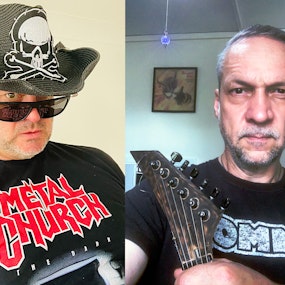
Philistine
Philistine is a Heavy Metal powerhouse based in the UK, originally hailing from South Africa. With a rich history in the Metal scene dating back to the mid/late 80s, Dean Smith and Marq Vas bring decades of experience and a lifelong passion for Heavy Metal to their music. Dean has served time in several pioneering Metal acts back in the day, including Ragnärok, Odyssey, 2 Dogs Funking and Brothering. Marq fronted the controversial band MetalMorhosis, and they often played the same stages. Seranim is their debut offering, a testament to their dedication to the genre and their commitment to delivering uncompromising, old-school Heavy Metal to fans around the world.
Featured Episodes
Here are some great episodes to get started with


















